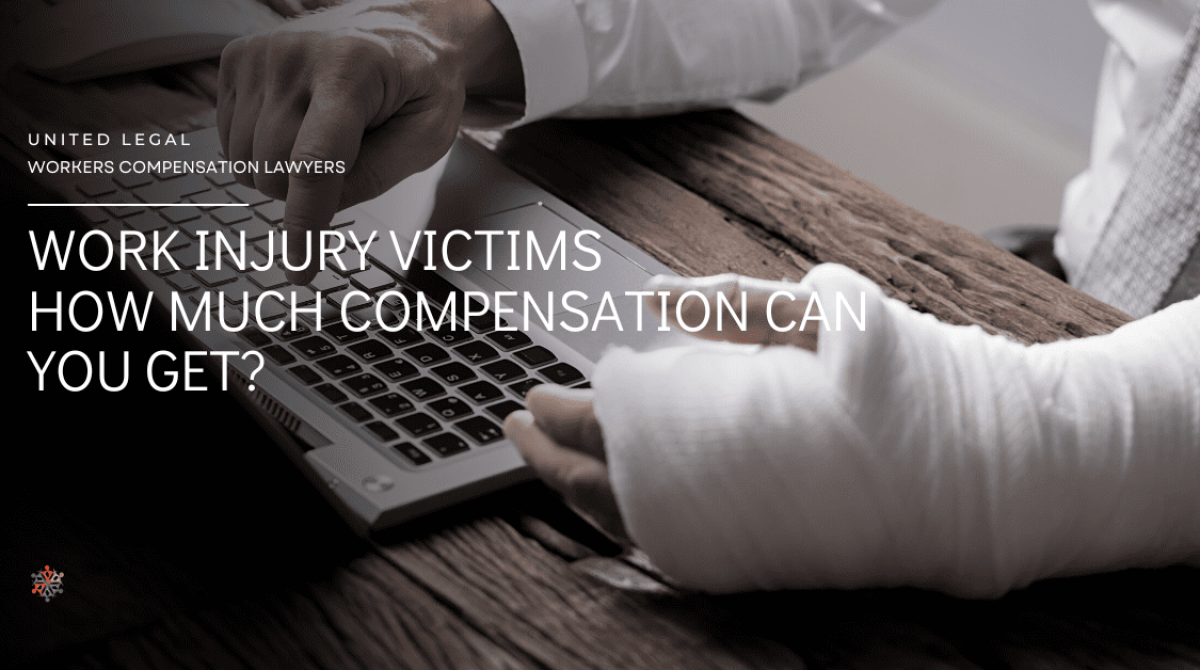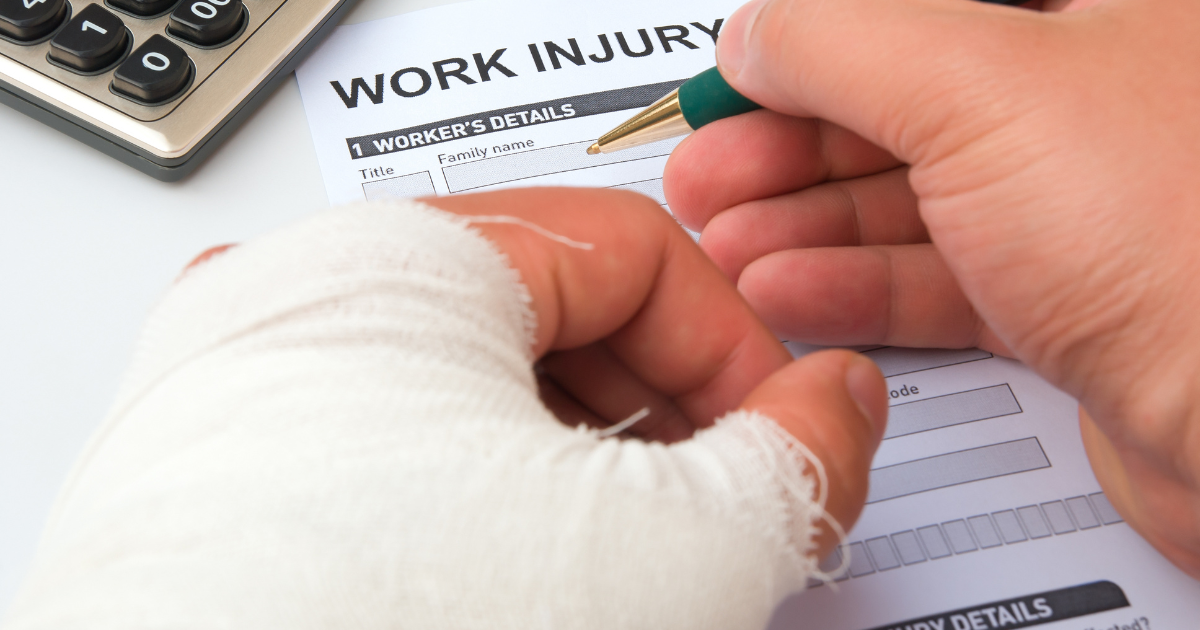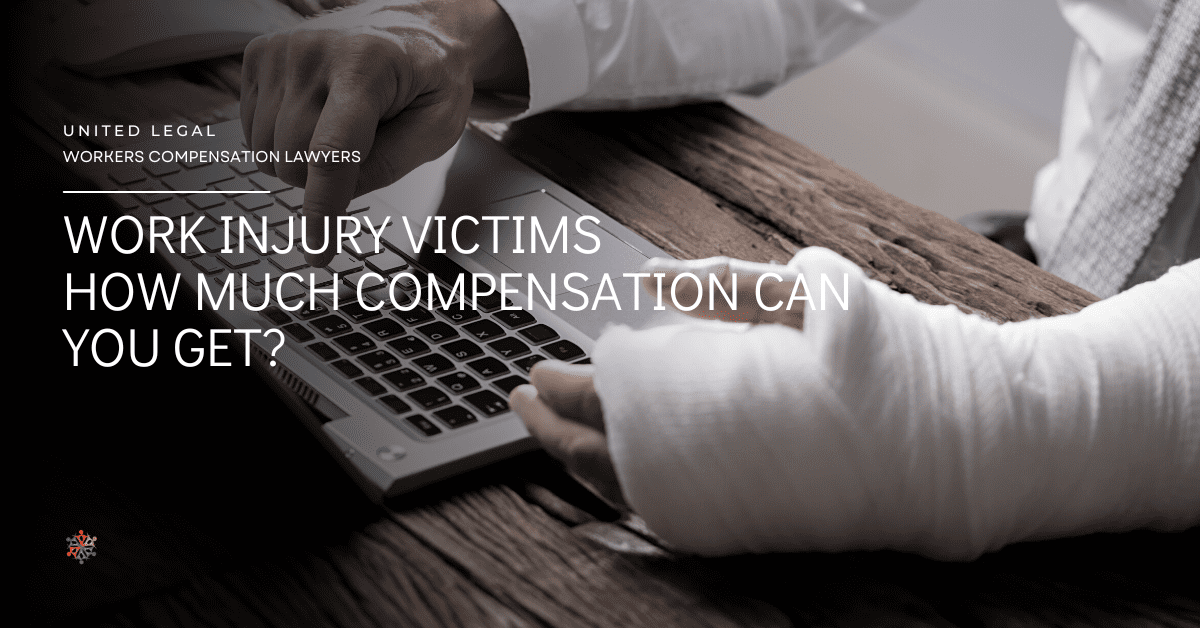Table of Contents
If you suffered an injury at work, then you may be entitled to workers’ compensation. Many work injury victims are eligible to receive lump-sum compensation for lost wages, medical costs, and future earnings if the injury impacts their working capacity.
A report from Safe Work Australia confirmed that 120,355 workers’ compensation claims were reported in 2019 and 2020. This created an urgency for intricate safety regulations for workplaces to comply with, ensuring employee safety.
When you have been injured through your employer’s negligence, you are entitled to receive some form of compensation. This can cover loss of earnings and expenses incurred as a result of being unable to work, as well as general medical bills such as surgeries. However, you will also have legal expenses that need to be taken into consideration when calculating what compensation you will receive – whether it is paid out by the employee who caused your injury or their employer, your insurance company or a self-employed workers’ compensation scheme.
Making A Workers’ Compensation Claim
If you are a work injury victim and need to file a claim, take the following steps .
- Notify your employer about the work injury as soon as possible to begin the compensation process.
- Consult with a medical professional, so they can assess your injury or illness and evaluate your physical and psychological health. Hence, they can recommend the necessary treatments for your recovery. However, it is crucial that you ensure the medical professional issues you with a medical certificate or work capacity certificate. This will give you any time you need off from work.
- Talk to an experienced workers’ compensation solicitor to file a compensation claim.
- In some cases, your employer or insurer may ask you to meet with another medical professional to provide further evidence that your injury is a direct result of workplace negligence.
How Can Work Injury Victims Calculate Workers’ Compensation?
Workers’ compensation schemes compensate for any relevant medical treatment, rehabilitation, or time off you may require to recover from your work injury. Essentially, there are three main factors that determine your workers’ compensation settlement.
- An expert medical assessment of the severity of your injuries
- Loss of earnings due to reduced working capacity
- Impact on future earning potential
- Death or funeral payments due to work injury or illness
It is important to note that while some schemes consider psychological trauma and mental illness in the same way as physical injuries, others don’t. Hence it is crucial for work injury victims to check their workers’ compensation scheme. These schemes will cover most workers, including full-time workers, part-time workers, and apprentices. Moreover, it may also cover employees travelling for work-related business.
In the event that claims are successful, work injury victims receive a percentage of their average weekly earnings prior to their injury. However, the percentage can tend to vary slightly across multiple states in Australia.
In the Australian Capital Territory, the percentage tends to decrease over time, depending on the time period. For the first 26 weeks, work injury victims receive 100% of their pre-injury earnings.
However, beyond 26 weeks for the time period the Court approves based on their medical assessment, they will receive 65% of their pre-injury earnings.
Different Workers’ Compensation Payouts For Work Injury Victims
While the compensation amount and time may vary for each individual case, there are multiple kinds of payments in the form of workers’ compensation.
Weekly Payments
These cover your weekly wage for the duration of your authorised medical leave. After submitting your work injury claim, the Court can take up to 38 days to make a decision regarding your eligibility for weekly compensation payments. In the case of a successful claim, the payments will commence within seven days after the Court announces its decision.
Medical Expenses
It covers the cost of your medical bills, hospital bills, rehabilitation, and any relevant travel expenses. You will need to provide your medical records and any other relevant bills to your employer. Following that, their insurer will reimburse you for the stated medical charges.
However, due to the unpredictability of employers and insurers, it is difficult to determine a specific time period for reimbursements. It is important to talk to your workers’ compensation lawyers to evaluate your circumstances and ensure that you are reimbursed timely.
Permanent and Impairment Payout
This payout covers only permanent impairments which are a direct result of your work injury. However, unlike other forms of payouts, there is one limitation here.
Work injury victims can file a claim only after the permanent injury has stabilised. Moreover, it is crucial that at least 12 months have passed since the date of your accident. After fulfilling these criteria, the Court will evaluate the level of impairment to calculate your compensation. However, the final decision may take up to 120 days.
Work injury victims who have suffered a permanent injury listed in Schedule 1 of the Act may be entitled to compensation. Schedule 1 essentially lists body parts and senses subject to compensation, assigning a specific percentage of statutory maximum to each. The single loss amount under the Act is $100,000. While work injury victims may receive compensation for two or more losses through injury, they are not eligible to receive more than the maximum loss amount – $150,000.
According to WorkSafeACT, since the nature of injury in Schedule 1 is based on an injured worker who is predominantly right-handed, the compensation percentages will be reversed for left-handed work injury victims. The loss of the right hand is 70% of the single loss, whereas the left hand is set at 65%. However, for left-handed individuals, the Court will reverse these percentages.
Work Injury Damages Payout
It is a lump-sum payout that covers any injuries sustained due to the employer’s negligence. It is important to note that this is one of the most common law claims.
However, you can only file a claim when the employer’s negligence has resulted in at least 15% permanent impairment. The Court proceedings and any relevant legal matters will commence within three years of the injury date. Other factors solely depend upon the individual circumstances of every case.
Death
If a work injury results in the death of a worker, the dependants will be eligible to receive a single lump-sum payment to cover funeral expenses and any other relevant benefits in accordance with the Act. However, in the event that the worker already receives compensation and dies within three months of the date of the injury, there will be restrictions on the compensation for the dependants. With that said, it will depend on the circumstances of the individual.
Making A Claim For Psychological Work Injury
Workers who suffer from work-related psychological injuries can also be also eligible for substantial workers’ compensation. However, such claims are often harder to prove due to the varying circumstances.
Workplace psychological injuries may arise in multiple ways. Some examples can include but are not limited to – bullying, harassment, excessive workload, toxic management, lack of procedural fairness or natural justice, breach of workplace policies, health and safety legislation, any traumatic workplace event, etc. Such factors can often lead to adjustment disorders, major depressive disorders, post-traumatic stress disorder, etc.
However, the legal obligation to prove that the psychological injury was a direct result of workplace negligence can be difficult and require additional evidence. The first step is to gather medical evidence from healthcare professionals with specialised experience in this area. Generally, a psychiatrist or psychologist will provide an extensive report for your insurer detailing your medical condition and any relevant treatments you may need.
For a successful claim, your employment must fall under “significant contributing factors” to the injury. However, the Court will not recognise it as an injury if it arises out of reasonable management action. Such actions can include transferring, demoting, disciplining, redeploying, or dismissing the worker.
Having said that, if the Court rejects your workers’ compensation claim, you can seek a review of the decision. However, you must submit it within three months of receiving the insurer’s written reasons for the final decision.
Talk To A United Legal Lawyer Today
Compensation is vital to any work injury victim. Although workplace injury can happen to any person, it is often more severe or extensive for those who work in dangerous or unhealthy environments. However, workers’ compensation cases get complicated when there are multiple defendants involved or when one party may be guilty of negligence that caused the injury. That’s why you shouldn’t hesitate to seek the advice and assistance of an experienced worker’s comp lawyer.
It can be overwhelming, however, given the variety of laws and regulations governing work injury claims and the sheer volume of injuries that come under this umbrella.
At United Legal, our highly-experienced work injury lawyers are dedicated to your legal rights and will represent you in Court to ensure you get the justice you deserve. We handle our cases on a no-win-no-fee basis to provide a simple and risk-free agreement that protects our clients financially.
Talk to one of our lawyers today for a detailed consultation with complete transparency to ensure a successful claim.











